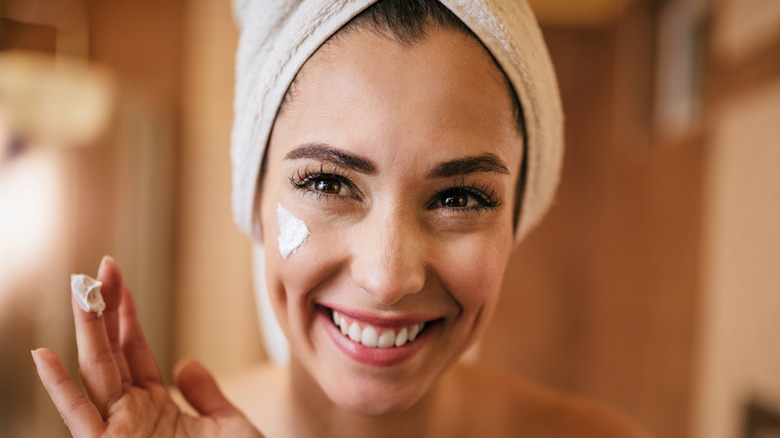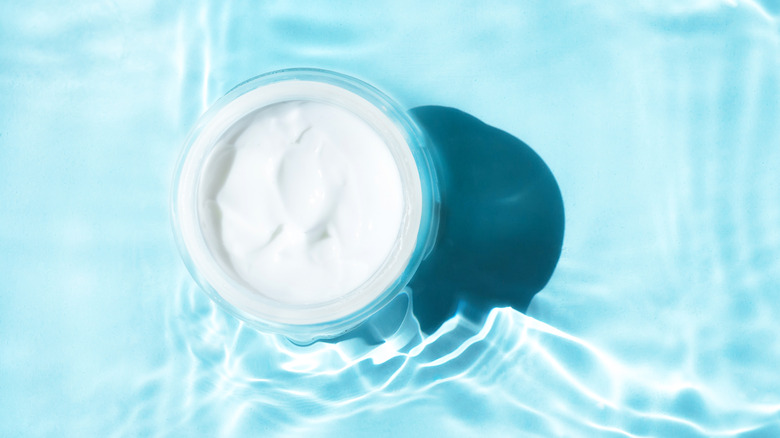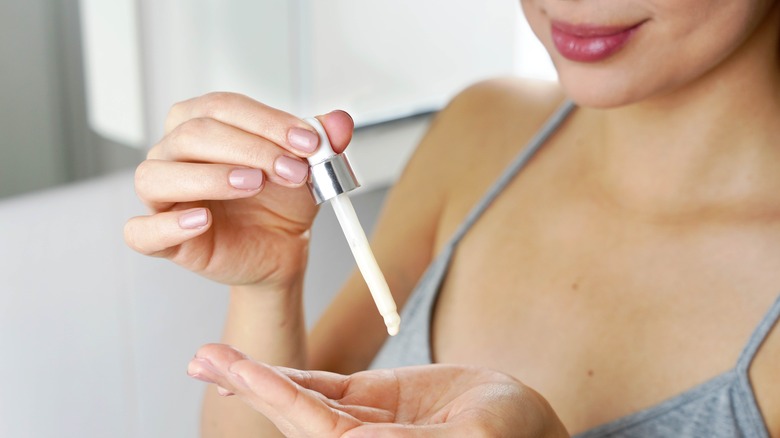Collagen Creams Aren't All They're Cracked Up To Be - Here's Why
In 2022, consumers worldwide spent over $4 billion on collagen creams, supplements, and foods. These products claim to erase wrinkles and fine lines, boost skin elasticity, and lubricate the joints, but their benefits are subject to debate. Notably, most studies on collagen supplements are funded by private companies and hence their findings may be biased.
Collagen is a naturally occurring protein in the skin, cartilage, muscles, and other tissues, but its levels decrease with age. "Starting in our mid-20s, we slowly begin to lose collagen," said Dr. Ohara Aivaz, a dermatologist at Cedars-Sinai. "For women, we can lose up to 30% of our collagen production in the first five years of menopause," she added. Also, note that smoking, drinking, sleep deprivation, and other lifestyle factors can speed up this process, points out the Harvard T.H. Chan School of Public Health.
As collagen levels drop, our skin loses its elasticity, resulting in wrinkles and fine lines. Other signs you need more collagen in your system may include brittle nails, joint pain, premature graying, and cataracts — just to name a few. Collagen supplements may help to some extent, but the results are short-lived. The same goes for collagen creams, which are poorly absorbed into the skin.
Collagen creams may benefit your skin, but their efficacy is limited
Topical collagen is supposed to plump your skin and reduce the appearance of wrinkles. Unfortunately, there's little evidence to support these claims. The collagen in cosmetics products is sourced from animal and marine tissues like codfish, jellyfish, and octopus, according to a 2020 review published in the journal Materials. However, the fibers contained in topical collagen products are too large to penetrate our skin, explains the Harvard T.H. Chan School of Public Health. "Unfortunately, the hype behind topical collagen is just that: hype," board-certified dermatologist Deanne Mraz Robinson told Mindbodygreen.
The skincare experts interviewed by Mindbodygreen agree that collagen creams hydrate the skin. However, these products won't restore lost collagen or take years off your face. Oral collagen seems more effective, but the research is inconclusive, notes the Harvard T.H. Chan School of Public Health. Additionally, the U.S. Food and Drug Administration (FDA) doesn't review their safety and effectiveness prior to hitting the shelves.
A 2022 review featured in Dermatology Practical & Conceptual says otherwise, though. After analyzing 12 studies, researchers concluded that both oral and topical collagen can minimize the signs of aging. In one study, collagen creams increased skin elasticity within a month of treatment. In another study, collagen serums reduced the appearance of wrinkles in more than 70% of women. But, as the scientists note, those studies were small and didn't include follow-up of the patients.
These skincare ingredients work better than topical collagen
Collagen creams can make your skin look plumper and more hydrated, but they won't boost collagen production. A better option is to apply topical products containing vitamin C, glycolic acid, or retinol. "Glycolic acid creates a wound-healing response that stimulates new collagen," board-certified dermatologist Joshua Zeichner told Mindbodygreen. Similarly, vitamin C increases collagen synthesis — but it's gentler than other acids.
You can also try a retinol cream or serum, depending on your skin type. Serums are more concentrated than creams and, therefore, may offer better results. By comparison, retinol creams are gentler and less likely to cause irritation, redness, and other adverse reactions. "Retinol has been shown to improve tone and texture, dyspigmentation, dryness, and fine lines," explained board-certified dermatologist Caroline Chang in an interview with Allure.
Most importantly, try to preserve the collagen you have. Get plenty of sleep, eat a balanced diet, and avoid sun exposure, suggests Harvard T.H. Chan School of Public Health. Also, note that prolonged or chronic stress can affect collagen levels. Therefore, it pays off to make time for yourself and build healthy habits like meditation, yoga, deep breathing, and regular exercise. Go one step further and create the perfect detox bath for stress relief (hint: it may benefit your skin, too!) before heading to sleep.


